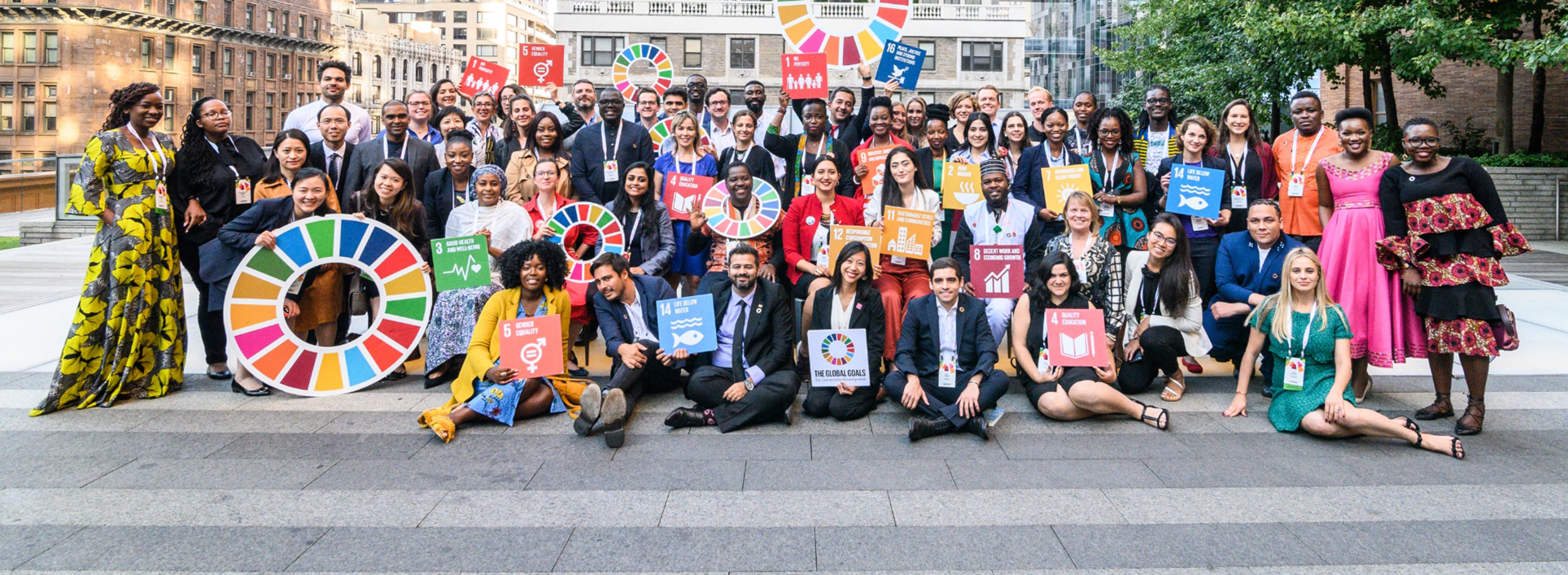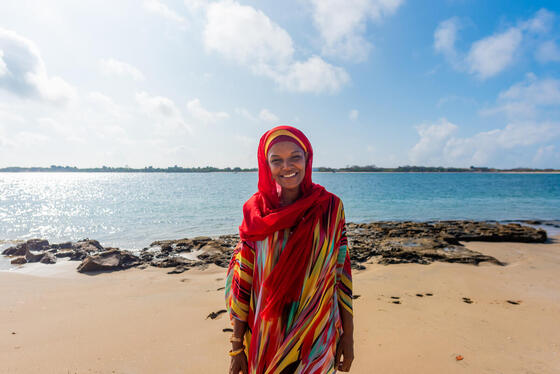
Aya Chebbi Goalkeeper

Aya Chebbi: Activist, Pan-African Feminist, Speaker
Founder and Chair, Nala Feminist Collective
Tunisia
Goal 16: Peace, Justice, and Strong Institutions
In this interview, we chat about everything from the hustle of activism and what it's like to gain visibility and resources in the global development sector to what she's currently watching on television. (The following interview has been edited and condensed.)
Blessing: You were born on the Tunisian and Algerian borders to a fairly conservative Muslim family. What do you remember about growing up?
Aya: I had a pretty nomadic, exciting, and enlightening childhood. I was my parents’ only child, and I was lucky to be raised by them. My father was in the army, and every two years we traveled to different cities. Everywhere we went felt like home. I wrote a lot of poetry, and because of my father’s job I had the privilege of trying sports like karate and horseback riding. But I also had a big moment of consciousness about my gender as a child. When I was about nine years old, I experienced a harmful traditional ritual called Tasfih, which means “the locker.” I still vividly remember it: An elder came in, scratched my knees seven times, and made me clean up the blood with seven dry grapes while repeating some words to seal the ritual. It was believed to protect my virginity. I also experienced street harassment early on. I didn’t always know what to do, but I knew I was experiencing these things because I was a girl, and I knew it was wrong.
Blessing: What was the moment when you first felt completely like an activist?
Aya: I became a political activist during the Tunisian Revolution. At that time, in 2011, I was always asking myself, where did I get all this fearlessness? Where did I summon all this courage from? But when I reflect, I realize that I had been preparing for this moment since I was a young girl. My family saw me as a rebel because I always spoke up, I always asked questions, and I pushed back against things that didn’t make sense. It helped that I felt protected by my father. He had my back—something to highlight for men who want to contribute to feminist causes. I think the revolution gave me that sense of protection again: Anyone who was going to harass me in a protest had to deal with the 100 women beside me.
Blessing: You’ve mentioned that the work of activism and advocacy is a hustle. You’ve had to hustle for money for your projects and for visibility. Do you have any tips for people who are looking for how to make their work more visible, or get funding for their projects?
Aya: For several years, everything I earned came from freelancing, writing, training...you know, hustling. As a blogger frustrated with the mainstream media narrative around the Tunisian Revolution, I wanted to change the narrative and just say, this is what’s happening in our country. It became easier to get financing for the movement because we were documenting everything. I think documentation is really important. Whether you’re an individual activist, a collective, or a movement, I always say: We make the news until we become the news.
Having been in that space for a while now, I am more interested in shifting the whole model of fundraising. Before, I was like, “No, I don’t need your money,” and now I’m engaging traditional donors because a lot of money exists, and we need it to go in the right direction.
Blessing: I’m sure you’ve experienced ageism and sexism while navigating multilateral institutions. How do you navigate these things?
Aya: There were a lot of meetings with heads of state where the gatekeepers were like, “What is she doing here?” And I had to make allies with women older than me in the development sector. These women opened the door for me. There were instances when the United Nations Deputy Secretary-General Amina Mohammed would give me her seat in a meeting, or when Dr. Vera Songwe of the UN Economic Commission would have my back on a panel. I gained so much from women like them, even by just observing.
Blessing: Were there times when you felt intimidated or insecure? What did you do?
Aya: I was criticized a lot, actually, about the way I dress, especially when I would go into the African Union building. But anyone can get used to anything, right? So instead of trying to restrict yourself to a space, make everyone get used to you. I give it a week, two weeks, three months, six months...eventually people become used to me and to my leadership style.
Blessing: Can you tell me in one sentence: What do Pan-Africanism and Pan-African feminism mean?
Aya: Pan-Africanism and Pan-African feminism mean my liberation is your liberation, and your cause is my cause. Pan-Africanism and Pan-African Feminism are built on the principle of Ubuntu—I exist because you exist.
Blessing: During the pandemic, you started the Nala Feminist Collective. Can you tell us a bit about what it is and what you hope to achieve?
Aya: I’ve been the noisy activist in anti-establishment spaces, and then I went into the belly of the beast. I understand both activism and policymaking, and why there is a disconnect. I feel more valuable to activists who want to influence policy. I envision the Nala Feminist Collective as this bridge to fill that gap between policy and implementation. We have convened a council of 17 women (including Goalkeepers!) who have paved the way in different industries—from the first Black woman to win Miss Universe to young women in government. We have a platform, we have influence, we have a following—we have the power to really shake things up.
Blessing: What does a typical Friday night look like for you?
Aya: It’s funny when people go to my Instagram and see videos of me rapping. You don’t have to do policy stuff and be boring. I work out, I hang out with friends...I’m watching Netflix like everyone else. I’m currently streaming I Am Georgina, because all my cousins are talking about it. I’m such a big believer in using popular culture for policy. And I am really glad that at the AU I was able to integrate art and creativity into my work. We need to bring joy to the work we do.

Aya Chebbi visits Kasbah Square in Tunis, Tunisia.
Photo courtesy of Gates Archives/ Ons Abid